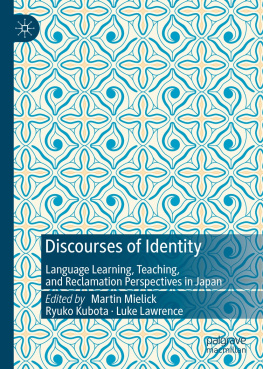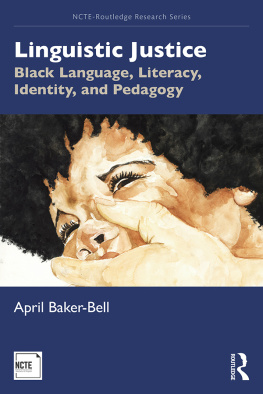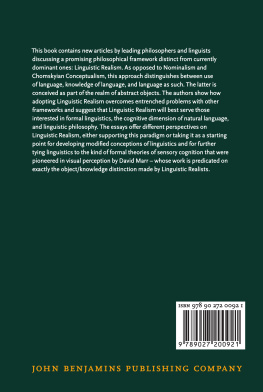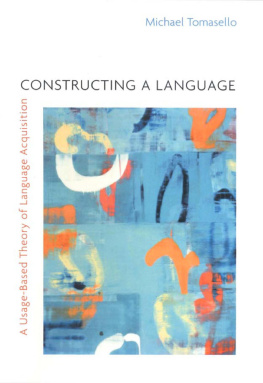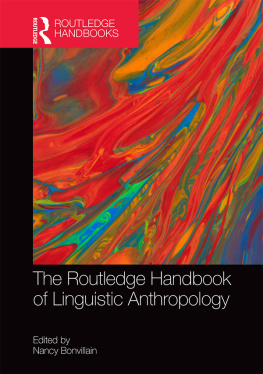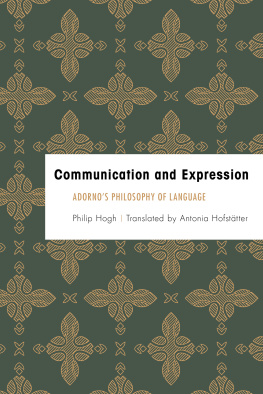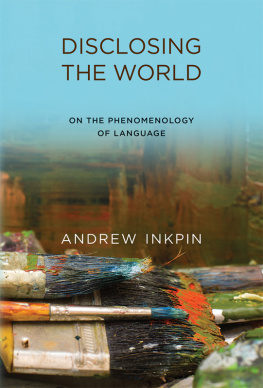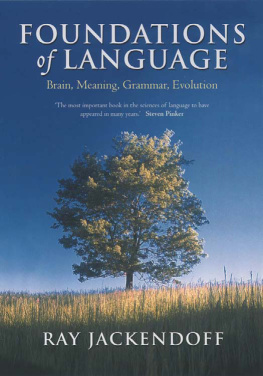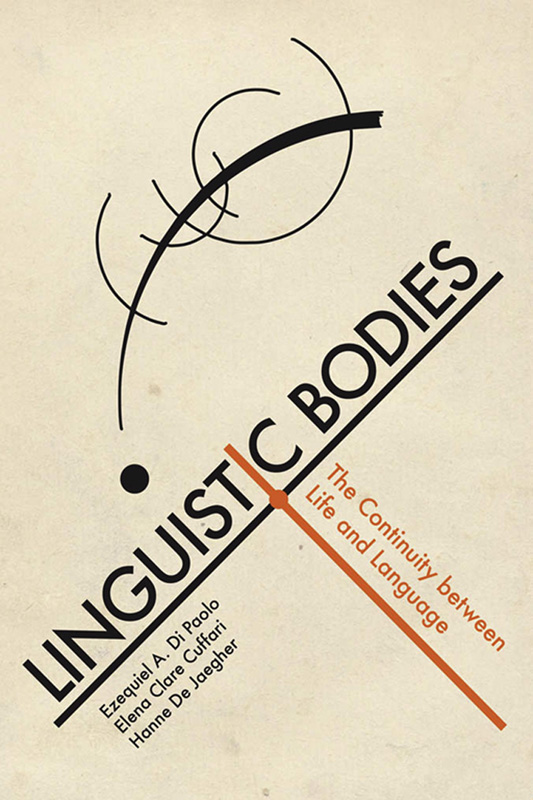2018 Massachusetts Institute of Technology
All rights reserved. No part of this book may be reproduced in any form by any electronic or mechanical means (including photocopying, recording, or information storage and retrieval) without permission in writing from the publisher.
This book was set in ITC Stone Sans Std and ITC Stone Serif Std by Toppan Best-set Premedia Limited. Printed and bound in the United States of America.
Library of Congress Cataloging-in-Publication Data
Names: Di Paolo, Ezequiel A. author. | Cuffari, Elena Clare author. |
De Jaegher, Hanne author.
Title: Linguistic bodies : the continuity between life and language /
Ezequiel A. Di Paolo, Elena Clare Cuffari, and Hanne De Jaegher.
Description: Cambridge, MA : The MIT Press, 2018. | Includes bibliographical
references and index.
Identifiers: LCCN 2018001231 | ISBN 9780262038164 (hardcover : alk. paper)
eISBN 9780262347273
Subjects: LCSH: Language and languages--Philosophy. | Language and languages.
Classification: LCC P106 .L53965 2018 | DDC 400--dc23 LC record available at https://lccn.loc.gov/2018001231
ePub Version 1.0
For Verena,
Giorgos and Kato,
Floris and Colette
Table of Contents
List of figures
Guide
Acknowledgments
Nowhere is the polyphony of voices behind each single linguistic act more felicitous an idea than in the writing of a book like this. Not only because it is a coauthored book, but because behind our own intermingling voices there are echoes of so many friends and colleagues that have helped the ideas in this book develop and continue to evolve.
Our work has been nurtured in conversations and discussions with colleagues, students, and audiences at various meetings. In particular, we wish to thank Tom Froese, Thomas Fuchs, Shaun Gallagher, Sanneke de Haan, Daniel D. Hutto, Thomas Wiben Jensen, Mark Johnson, Joanna Rczaszek-Leonardi, Daniel Shartin, Jrgen Streeck, Henry Theriault, Kristin Waters, and Tiara Yahnian.
For reading and commenting on different parts of this book, we are especially grateful to Thomas Buhrmann, Julian D. Kiverstein, Charles Lassiter, Marek McGann, Yanna Popova, and Evan Thompson. Thanks again to Thomas Buhrmann for helping with the cover design.
For their support and inspiration, we thank our families: Verena Fischer, George and Niketas Fourlas, Jack, Lisa, Peter, and Madeline Cuffari, as well as Doran, Tasmin, and Karsten Osterhold.
We are thankful for the support of a Faculty Mini-Grant from Worcester State University, and the accountability provided by the Faculty Writing Group.
The central chapters (7 and 8) of this book are a significant expansion and development of ideas that first appeared in the following open-access publication: Cuffari, E., Di Paolo, E. A., & De Jaegher, H. (2015). From participatory sense-making to language: There and back again. Phenomenology and the Cognitive Sciences, 14(4), 10891125.
That piece of work was the result of a collaboration made possible thanks to the funding and environment provided by the interdisciplinary Marie-Curie Initial Training Network TESIS: Toward an Embodied Science of InterSubjectivity (20112015, FP7-PEOPLE-2010-ITN, no: 264828). To the coordinators of this network, and the colleagues and friends in all of its 13 research nodes, our sincere thanks. We hope this book will be seen as an example of how the combination of vision, bold ideas, community spirit, and human interaction will continue to bear fruit even after a projects official end date. Foresightful funding bodies should never lose sight of this fact.
Making Introductions
1.1Letter of Invitation
You, dear reader, are a linguistic body.
On some days you wake up with a to-do list already assembling itself, propelling your feet to the floor. Other times, perhaps, you arise leisurely into an unplanned morning. Always, you have choices to make. You check messages. You are intimately connected with the activities of others, be they the drivers of the cars that surround you on your way to work or a sibling across the country who calls late at night for advice. You ride tides of emotions: shouting headlines, outrage in the streets, tension at the kitchen sink, infectious joy. Sometimes you are inundated by demands. You, too, seek explanations, reasons for things. You talk to yourself, in the voice of a parent or a friend. You talk to yourself without words.
You, our reader, being the sort of linguistic body that you are, maybe have some passing or more than passing interest in philosophy, or another field like psychology, anthropology, religion studies. You have been told some of these things about yourself before. Since at least Aristotle, humans have been telling each other that they are special because they have language. Zoon logon ekhon and all that. Certain thinkers resist the possessive anthropocentric formulation; instead of saying humans have language, they say humans are in language. Yes, humans are animals that speak. Yes, language, as a system, as a history, as a practice, in its multiplicity, always precedes us. But we are saying something else.
We are not approaching you as a member of a species. We are not appealing to the highest or outermost layer of skills by which you manifest your evolutionary stage. Nor are we trying to make contact with pure transcendence. We prefer not to assume you face tasks as a computational system does. We write to you as particular linguistic bodies addressing other particular linguistic bodies. We are trying to figure out how to begin, with you. We are asking ourselves what might have moved you to acquire and open this book.
Of course, we cant know the answer to that for certain. We have to go by what our work leads us to think about linguistic bodies in general, and what we cant help but assume about the more specific subsets that you, as our reader, may fall into. What might we already say, at this early moment, about what linguistic bodies are?
First, they are bodies. You are bodies. Yes, bodies. Organic, sensorimotor, intersubjective. As a linguistic body, which, as well explain, exists as a process of navigating and blending social and personal orders, you bear a simultaneous relation of distancing and ongoing orientation toward your own sensorimotor and organic dimensions. You enact your bodies through a special kind of agency.
As a linguistic body, you are made up of utterances and relations between utterances. Your linguistic agency consists in orchestrating and ordering these utterances. We will talk a lot more about utterances as the book goes on. They are acts. They are embodied, material patterns enacted by organic and sensorimotor bodies. They unfold in space and time. They have consequences. Unlike other acts, utterances have an inherently dialogic structure. This means that they orient and position peoplespeakers, hearers, charactersvis--vis one another and situations. Utterances engender recognition and interpretation. They are acts that demand, and create, participants. Like you.
You have grown up in a milieu of utterances. (We presume to know this much about you, at least.) You have always worked at navigating them, at keeping your head above water, as it were. You individuated yourself out of waves of utterances flowing all around you. You still do. This is the paradox of being a linguistic body: you must make yourself out of others. For reasons we will develop, you are responsive to these special acts of other linguistic bodies. You yourself must act likewise. But also differently. In your own voice, your own stylethe style that you have borrowed, bent, hammered together, or slowly absorbed. This is how your story as a linguistic body begins and ends: by


